https://www.youtube.com/watch?v=lwsvHJni0PQ
Jet Tila's Mongolian Beef _ In the Kitchen with Jet Tila _ Food Network

Jet Tila here .
And today we're making Mongolian beef that Chinese American comfort delicious classic .
Uh The secret here is getting that beef super tender and I'm gonna show you exactly how the restaurants do it .
Let's get started .
The big secret I want to let you in on in this dish is how to marinade your meat at home and get it walk tender like they do in the restaurants .
So let's start by marinating our beef .
I'm starting with flank steak , which I think is probably the best all purpose cut of beef for the walk because it's chewy .
Um But if we tame it with this marinade , it has a really beautiful beefy taste .
These are the secret ingredients to marinade uh your meat at home like the restaurants baking soda that's gonna help tenderize the meat .
There's a fancy word that chefs use called denaturing , but all that really means is getting that meat to kind of like fall apart by means of the baking soda .
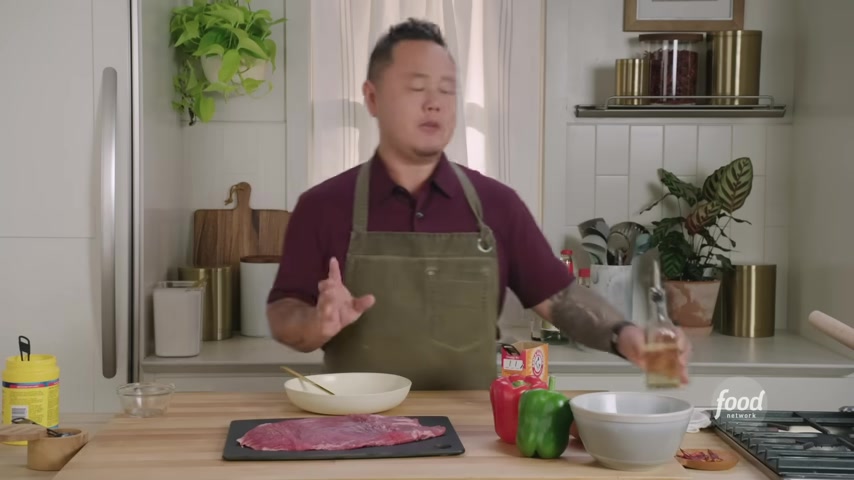
So the next thing is cornstarch , cornstarch is going to help pull in the marinade flavors and also create that kind of fun kind of slippery texture .
So those two kind of alter the meat texture .
We want salt now to give flavor to really punch up that beefiness .
So we're gonna have to add some water to distribute all of those ingredients and then we're gonna add a little oil .
Now , what oil is going to do is keep you from using too much oil in the wok .
It's kind of like getting the oil in earlier .
So when the meat hits the pan , it doesn't stick .
So , all right , marinade is made .
Now let's cut the meat flank steak .
The classic kind of chef tip of cutting against the grain applies here .
First , I'm gonna cut with the grain .
I want cubes here .
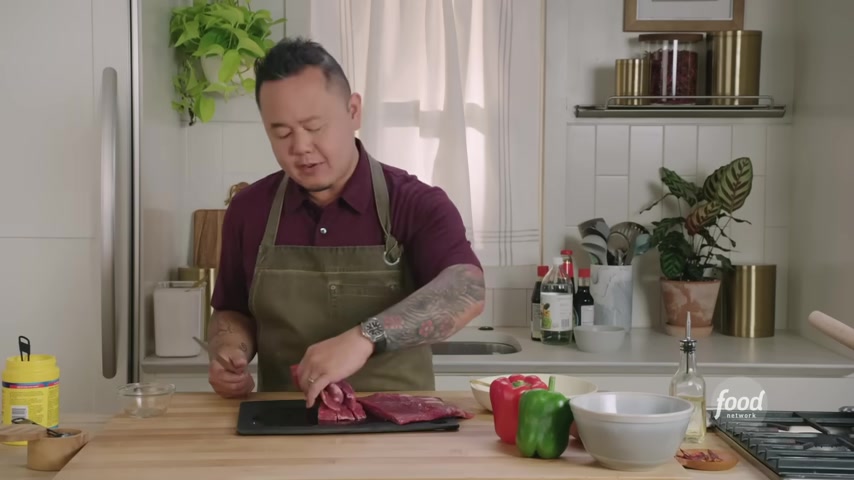
So let's say one inch by one inch .
So I'm gonna go with the grain one inch .
So what you see here is an entire flank steak , as you would see it at the market , you can ask the market to cut off a half or you can go by the poundage you're going to need , I'm only gonna use half this flank steak .
Now , cutting against the grain simply means cut against the muscle fibers because if you cut against the muscle fibers , there's nothing to hold on to imagine a cluster of rubber bands .
If you cut against the rubber bands and they splay open , that's really similar to the proteins in the meat .
So when you cut against the grain , the meat stays tender .
All right .
So now I've cut the flank steak into one inch strips with the grain and now I'm gonna cut them into one inch pieces against the grain .
So I'm cutting cubes today .
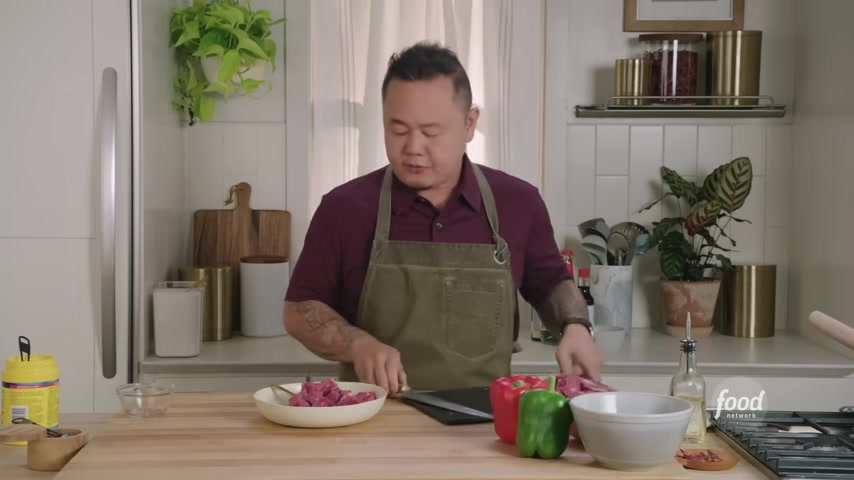
Um , but if you wanted that classic two inch wide kind of plank that like most stir fries are made of , you would actually marinate it the same way , but you would cut it against the grain kind of this way .
Oh , ok .
So the marinade is done .
So you really wanna work that marinade into the beef ?
Um Pretty well .
I mean you want to massage it in there because you want the baking soda and the corn starch to really coat the beef .
Well , what's gonna happen is as it marinates , the meat starts to tenderize and it sucks in all that flavor .
All right .
So um let me wash my hand really quick to stay clean .
All right .
So with clean hands , I'm gonna wrap this tightly and stick it in the fridge .
The marinade is gonna work its magic .
So give this marinade at least 2 to 4 hours all the way to overnight to really get it super tender .
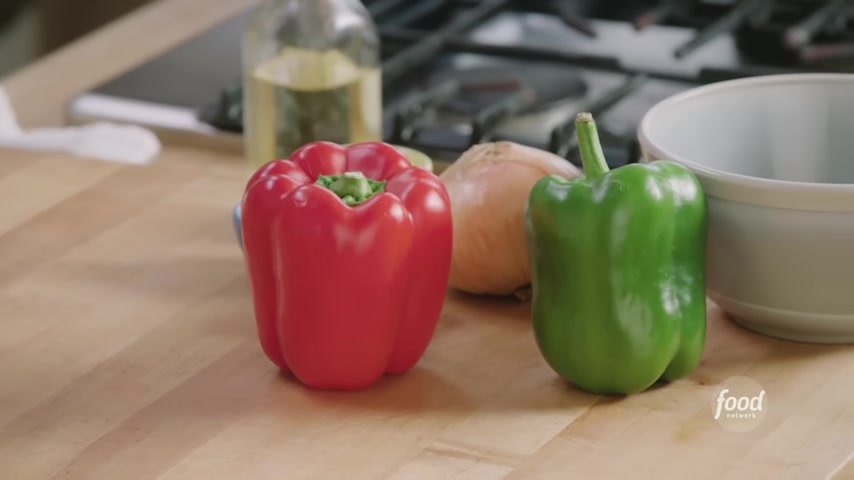
So while that's marinating , hit paws and come back when it's time to cook .
Welcome back .
So the beef is marinating , it cannot over marinade .
So we're gonna take a few more minutes to finish our prep and then grab it .
All right .
So let's get down to the veg prep part of this um garlic .
So the way to cut garlic is to leave the whole head intact and just cut off a little bit of that root .
End all the garlic cloves are only holding on by this little piece here .
Now , you can actually just get in and break off the cloves that you need .
If you lean down with your knife onto each clove , the skin literally will just pop right off that simply .
Now with the garlic cleaned , I'm gonna show you how to mince .
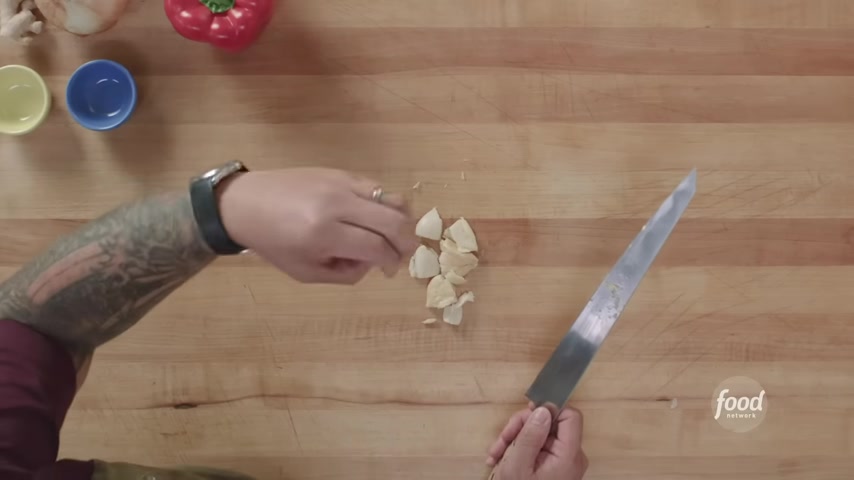
Don't mince garlic too finely for the walk .
All you're going to do is smash it as flat as possible .
And then with your guide hand , which is your non dominant hand , make sure to curl your fingertips under and make sure to keep that thumb behind uh those guide fingers .
And I'm just going to do a nice thin slicing pass meaning quarter to an eighth inch .
Once that's done , quarter , turn the garlic and then give it another thin slicing pass .
That's as far as you're ever gonna need to take garlic for the Asian kitchen .
I'm gonna push that over to the side .
I also like rinsing my knife after garlic because garlic has these really delicious pungent oils , but they are sticky .
So give that knife a good wipe .
All right , bell peppers .
Uh This is how I like to cut bell peppers .
Um Remember the jet Tila rhyme .
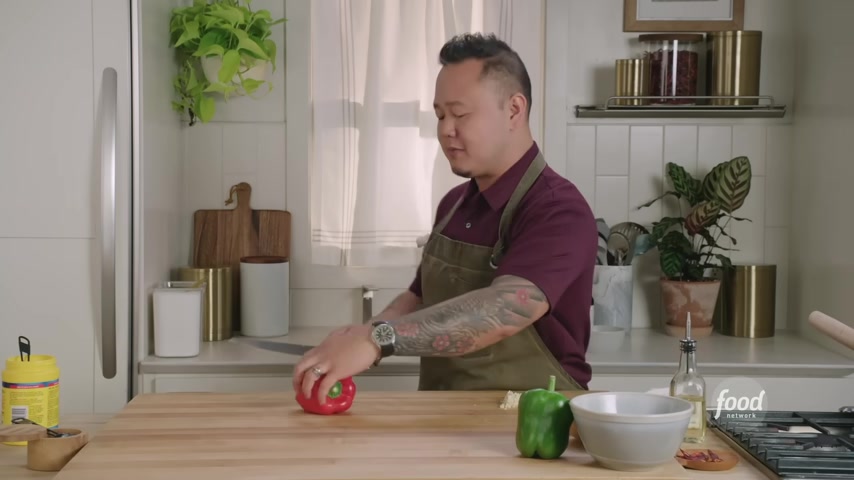
A tile becomes a slice , a slice becomes a dice .
So first we'll take a quarter inch tile off the back , we'll take a quarter inch tile off the front .
And usually if you know what you're doing , the stem pops right off just like that .
And now , uh , insert the knife into one side , don't go all the way through , flatten the knife and just roll the seed pod away and you get these perfect little planks of bell peppers , I'll do a little faster on this one .
So front , back knife in and roll .
It's also a really cool way to impress your friends .
Uh , when they come over also to keep your work efficient .
I like to put , uh , both bell peppers on top of each other , cut them into planks .
And for this , actually , I think I'm gonna cut large dice .
So , uh , one inch by one inch works for me .
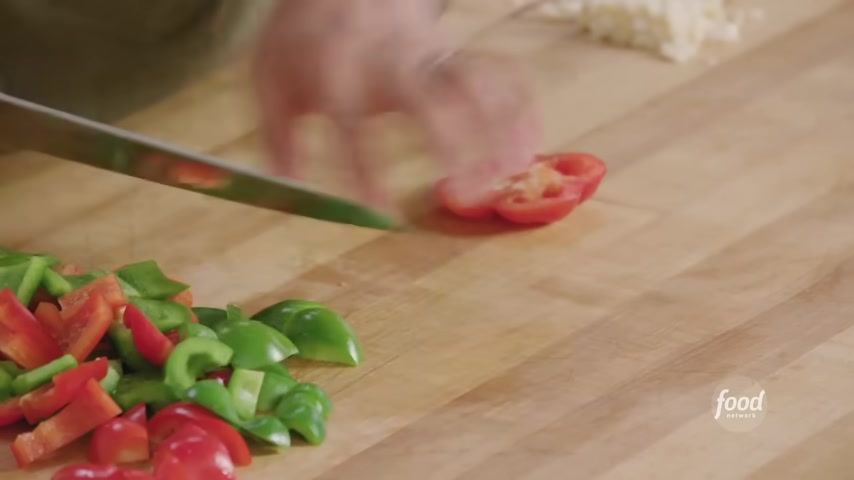
So there and I want both colors and same thing here .
And if you wanted to save some for garnish , I'm totally cool with that too .
And with the tops by cutting your bell peppers this way , you have zero , waste .
Awesome , really fast and really easy .
I also like using a big cutting board because my wife can't stand it when there's a bazillion bowls .
Be thoughtful of the people who clean up around you .
And if it's yourself , makes your life a lot easier .
So the way I like to cut onion is to take about a quarter inch slice off the top .
And I do the same thing to the root side .
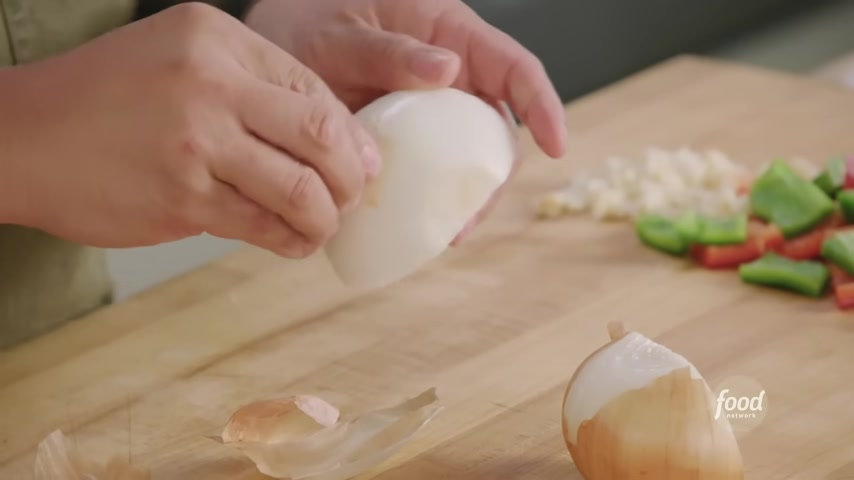
So the onion sits up straight , cut the onion right in half , North Pole to South Pole and peel them .
This way makes life a lot easier .
Onions are so much easier to peel um , in the halves and once your halves are peeled , you have a lot of options .
I could slice , I could dice , I can cut Leonis .
But for uh this dish , I'm just gonna do large dice .
Another good tip for you .
Let's always cut the root end again .
You can actually tell if you see the rainbow .
That's the front , the , the top that grows up and this is the root which goes down .
Um I want you to cut that root end right out because that's the piece that holds the onion together by taking that out .
When you cut the onion up , it falls apart beautifully .
So for large dice , I'm just gonna go half and then come the other way and cut one inch pieces .
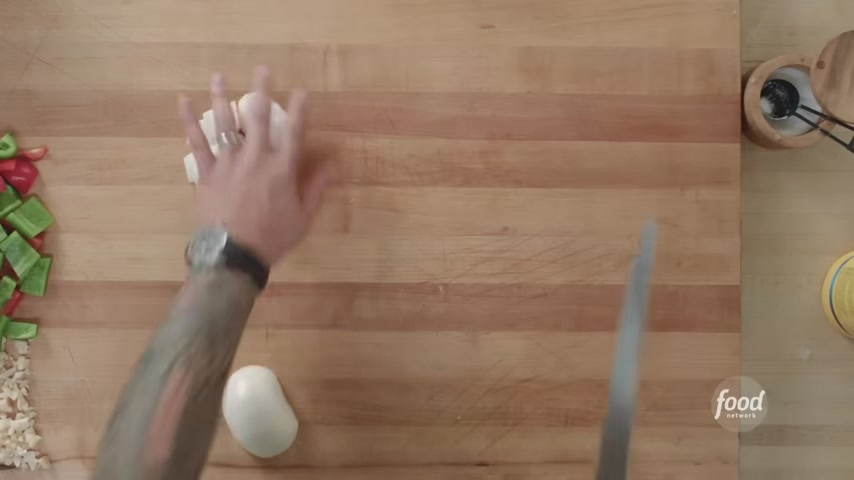
And as you can see the onion falls right apart , so half one inch pieces and the last thing I need to cut is ginger .
Ginger is quite intimidating to some people , but I'm gonna show you how to make it really simple .
I just want you to square off the pieces of ginger .
And if you see like little fingers just go and break them off , just kind of isolate the largest kind of mid piece possible .
And if you won't sit up straight .
You know , you need to kind of tame it down like that .
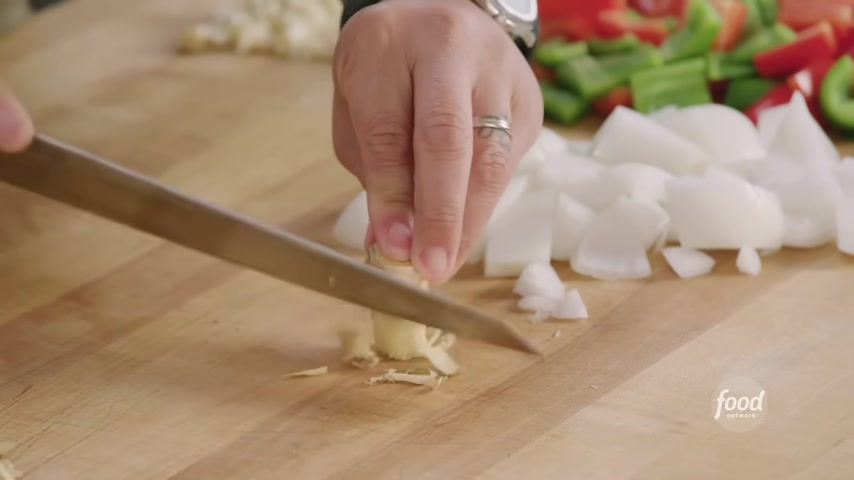
And then you're gonna take the , the the edge side of the knife and just apply really , really light pressure and just turn it just spin as you're applying pressure , the skin of the ginger will just peel away because there's a moisture layer in between the skin of the ginger and the actual body of the ginger and peeling ginger actually is purely cosmetic .
Uh You really can't taste the difference between peeled and unpeeled .
So for this cut , I want that blades of grass cut .
So again , if it rolls tame it eighth inch slices and then I'm gonna stack these eight inch slices on top of each other and cut these eighth inch slices .
Also kind of known I like to call this cut the blades of grass cut too .
So if you can see they're perfect little blades of grass and I'm going to leave them like this .
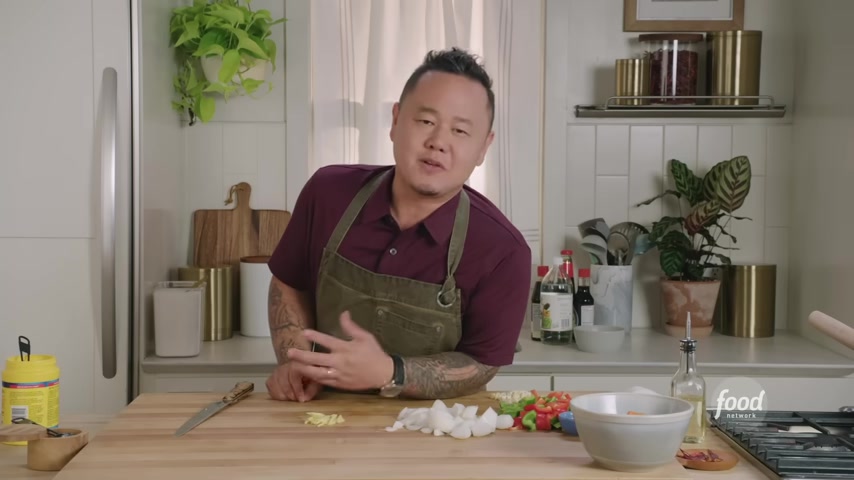
If you wanted to mince just cut these perpendicular and you get the perfect mince .
All right .
So ginger done .
So I know this cut looks really fancy and uh don't let it intimidate you if your cuts don't come out like this .
No big deal .
Um I just want small and uniform .
It's gonna work perfect in this dish .
Last thing we're gonna cut are scallions .
Mongolian beef is a great dish because it really gives you a lot of knife practice .
Those of us that are hardcore knife heads .
We can get in there and uh and get a lot of work done here .
Um With scallions , I take the root side off , I line them up .
I take the top side off .
I'm gonna show you how to cut scallions two ways .
That'll look really nice in this dish .
So let's separate kind of the whites from the greens with the whites .
I just want you to buy a slice them into one inch and all that means is this is perpendicular , put a little angle on it and keep them about one inch .
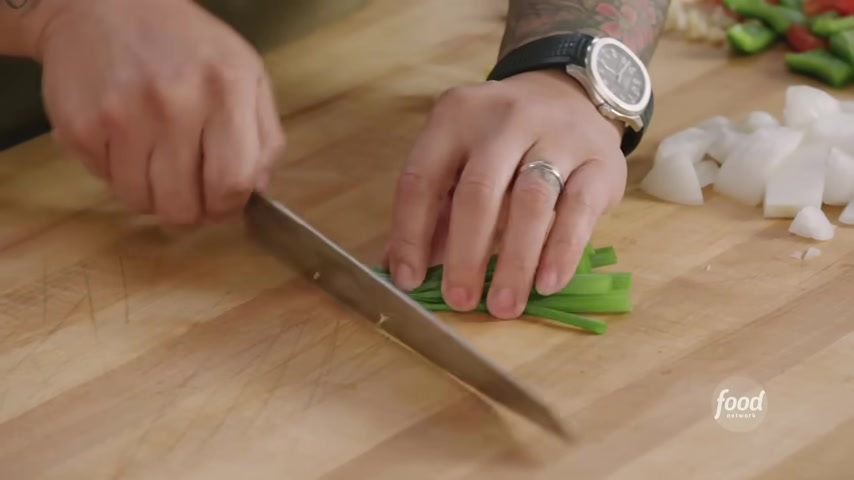
And we're gonna cook these like veggies with the onions and the bell peppers .
Let's take the greens now and create a beautiful garnish .
So all I want you to do is kind of stack them .
Uh remember perpendicular is no bueno in the kitchen .
You want a nice little angle and then with this little bias slice , it creates a really pretty garnish and um I always do them this way just because they look better and you always eat with your eyes before you actually eat the food and the food looks great .
It's gonna taste better , right ?
Scallions are done .
I just need to make my sauce and we're ready to go .
I want you to think about Asian food as five flavors , right ?
Hot sour salty , sweet and savory .
So we're basically mixing uh these sauces that equate to those flavors .
So oyster sauce is the champion , right ?
That's gonna be your kind of every flavor sauce except spicy .
That's gonna have a nice sweetness , a good savoriness , uh , a touch of acid in it .
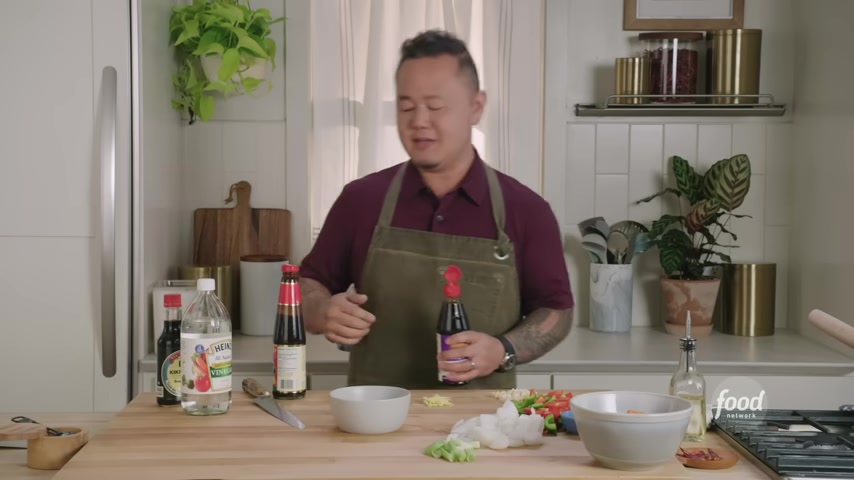
Um , and , and if you had to go into a , a culinary knife fight with just one sauce , oyster sauce would be my sauce for sure .
It really can do just about anything .
Hoisin sauce .
Adds a beautiful kind of sheen and sweetness , soy sauce gives us a nice kind of uh salty backbone .
A really nice kind of support .
And then uh vinegar is always going to lighten and brighten a dish .
So I'm not looking for a lot because I'm not going for that kind of sweet and sour flavor .
But I want acid to really kind of bounce and round out these flavors .
Few more things , garlic , ginger corn starch and water together to get it to kind of make a gravy and stick to the beef .
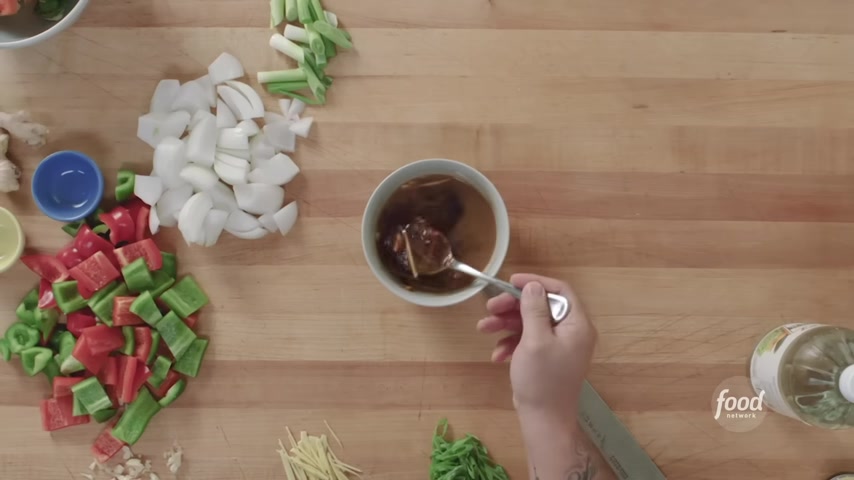
You want to make a slurry and all that means is equal parts corn starch to water in there and then mix it all together .
So corn starch is what thickens sauces , but it needs to go in by way of a slurry because cornstarch right into food will basically just clump up .
It's such a fine textured powder .
It will not blend into thick sauces .
So you need to thin it out first with water and then introduce it into your sauces that way .
And that's what we call a slurry just like that .
And although it's cloudy in the bowl , cornstarch activates at 100 and 60 to 180 degrees and clarifies and gets beautiful and shiny .
I know you're watching me eyeball the amounts .
Um , I've made this dish about a bazillion times before .
Follow the recipes and it'll come out perfect every time .
All right , family .
Let's get hot .
Let's get that walk hot and let's fire this dish .
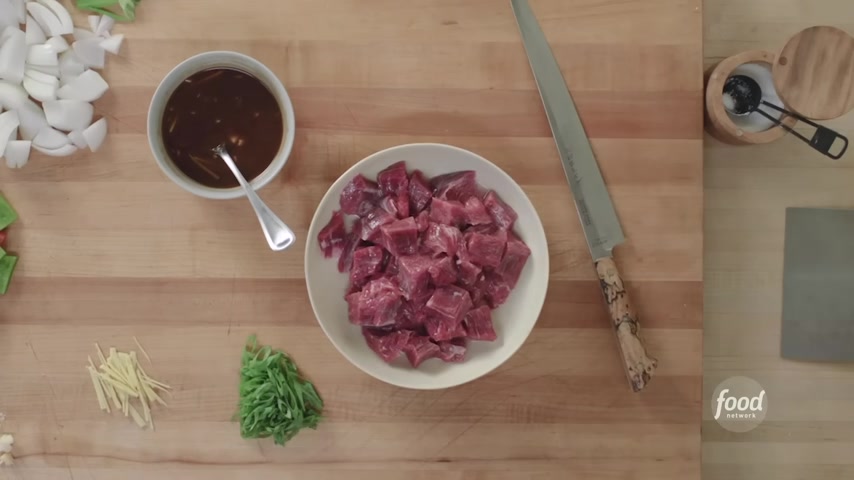
Ok .
Wok is getting hot .
Let's pull the beef out of the fridge .
That's been marinating .
What you're gonna notice is the beef is actually absorbed that water , the corn starch .
So it's gonna feel kind of dry .
But once it hits the pan , you'll see it gets beautiful , shiny and tender .
So if your beef needs more time to marinade , feel free and just hit pause and come back to it .
But if you're ready to go , let's get cooking .
So this is a brand new fresh walk from the market .
Here's a really cool tip .
If you fire the walk and you start to smell kind of like a little plastic smell .
That means this walk has a little plastic coating on it .
And it's very simple to remove .
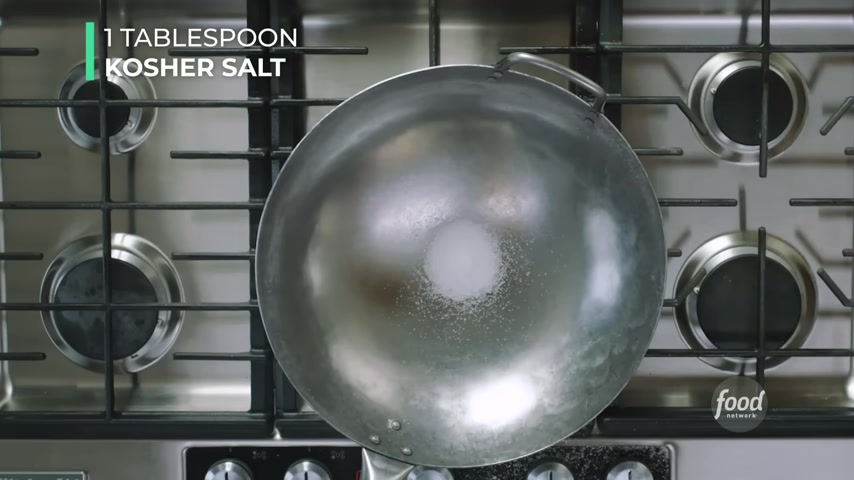
Take a big fat tablespoon of kosher salt , take some paper towels and just carefully , very carefully , just kind of scour the inside of this walkout and that helps kind of polish down any of that kind of coating that .
The walk might ship with and then get rid of that salt .
There you go .
A walk that is prepped and ready to use for the first time .
Um , ok , so we're gonna cook this in kind of two steps .
We wanna get the beef cooked first because the beef is in such big pieces .
We're gonna cook that first .
Drain off the oil and then continue cooking the rest of it .
So I'm gonna use a little bit more oil than I need .
Dump out any excess .
And you want this pan pretty ripping hot , the hotter this pan is the less the meat's gonna stick .
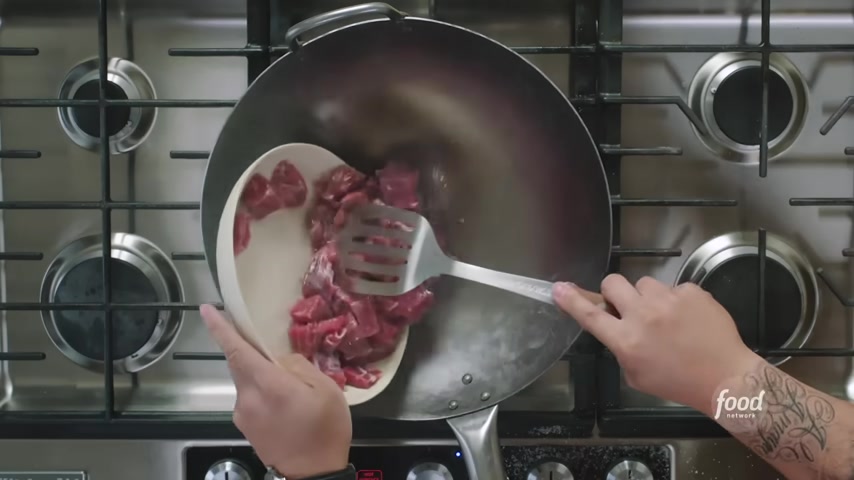
So , very gently slide that beef into the center because it is a hot pan .
You don't want this to splash , get that oil around and let this beef really sear up on its own .
This is where you're OK using more oil because all I'm gonna do is drain off the excess that I don't need in a Chinese restaurant .
They're actually precooking this beef and oil first before they bring in the rest of the components .
Every good cook , you have two jobs , fold the food over and then scrape down any bits that are sticking .
If you stay ahead of it , you won't get any burned bits in the pan .
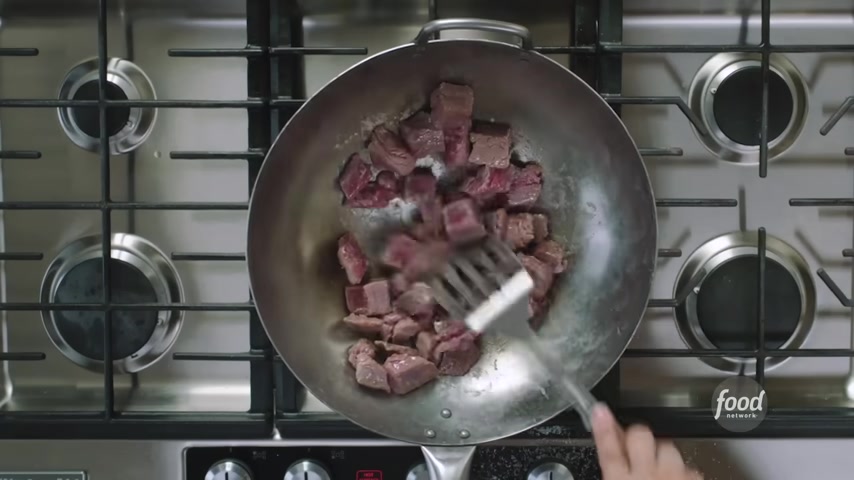
So I want you to just brown the exterior of this beef and take it to about medium rare because I'm trying to account for the cook time of what's left .
So I've got big old pieces of onions .
I've got big old pieces of bell peppers and they're probably gonna take about 4 to 6 minutes .
So I need to get this beef from 4 to 6 minutes of perfectly cooked if that makes any sense .
Thank you .
Use the surface area of the walk to make sure you're getting as much searing as you can with this beef .
And again , I've used flank steak here .
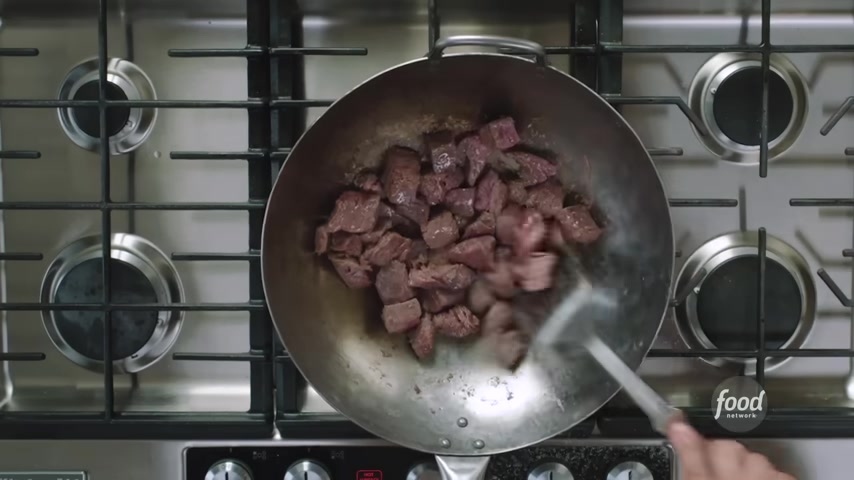
But if you want to get really fancy and use like a filet mignon or tenderloin , that's also a beautiful way to go with this dish .
So , yeah .
OK .
OK .
Course almost there .
OK .
That , so uh the beef is medium rare and I want to drain off any extra oil I really don't need .
So I'm gonna give it a final really good scrape and then just drain off any excess oil that I might have .
All right back to the pan aromatics first .
Let's add the garlic and ginger .
We cut to really get those flavors to open up .
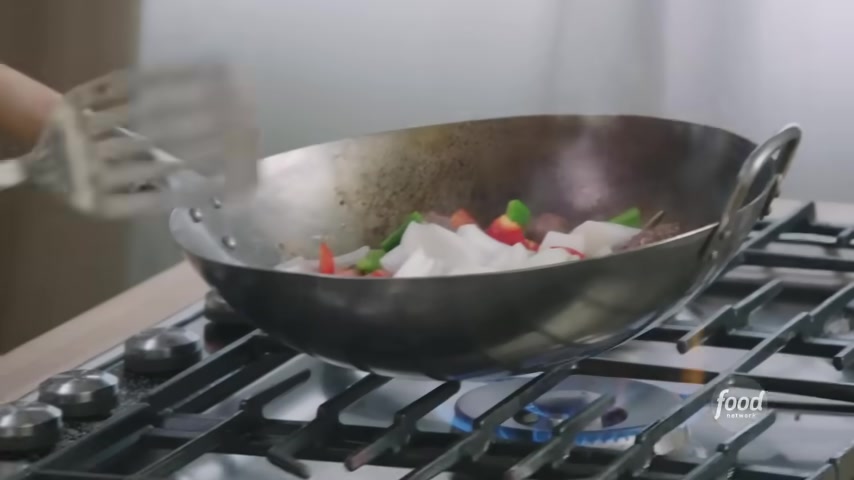
So it's time to add the ginger and garlic because the beef is medium rare .
You can tell it's medium rare because it's light pink in the middle and brown all around .
So bell peppers and onions were cut to the same size .
So they're gonna cook at the same time .
Yeah .
So I cut way more bell peppers and onions than I needed because I really wanted to show you that technique .
But I'm just gonna reserve these for the next dish and all you're looking for visually is uh a browning of the edges of the onions and the bell peppers don't overcook it .
Ok .
All right .
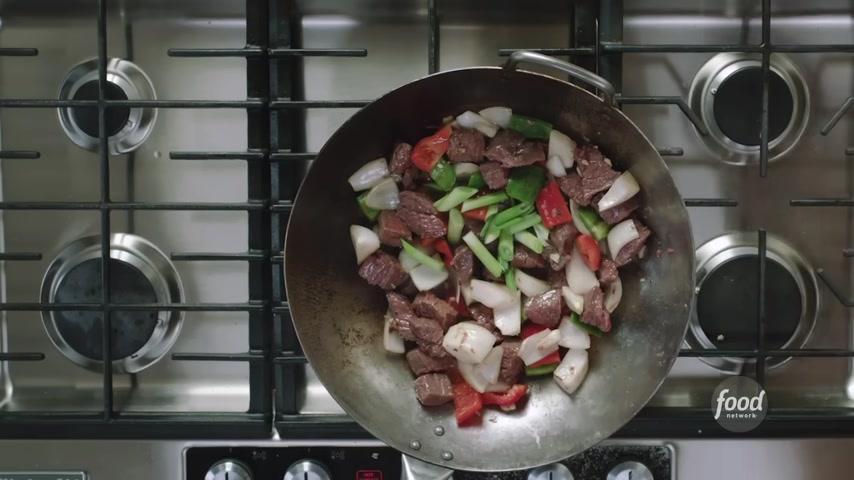
Let's get the scallions in that we left large and I'm gonna stir this sauce before I add it to the pan because I want that corn starch to be really mixed in .
And this is the perfect time to add some dried chilies .
And all I'm doing now is kind of bringing that sauce to a boil , getting that sauce to that 160 to 180 degrees .
So it clarifies and really cooks into a really beautiful glaze .
That Mongolian beef is definitely one of those um Chinese American classics that existed for a long time .
And a lot of people kind of try to bust my shops about authenticity .
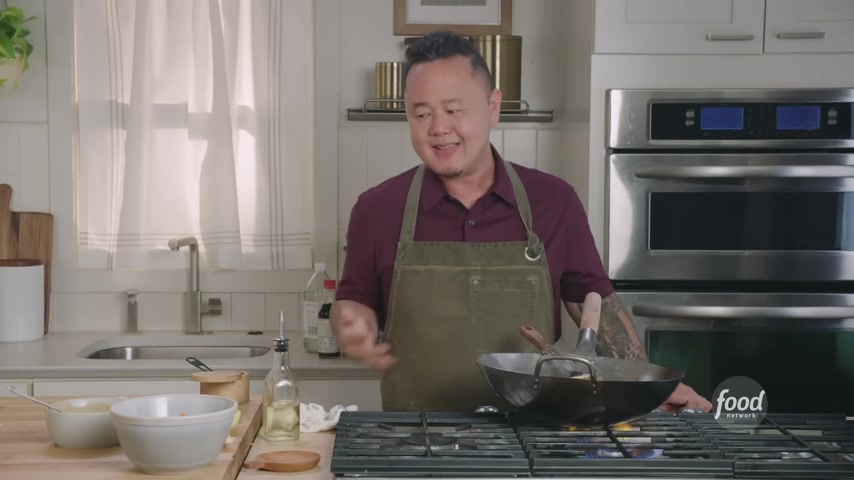
I mean , I'm an Asian American kid born in the United States .
This dish is authentic to me , you know what I'm saying ?
So , you know what ?
I have no issues calling this an authentic dish .
So the sauce is actually starting to bubble and thicken and that's telling me I'm really close to done .
All right .
Um Beef is cooked through the veggies are seared , but they're not kind of limp and falling apart and the sauce is sticking to a beautiful gravy .
Oh my God .
Let me look at that .
Sometimes you'll see this served over um a bunch of crispy noodles or a bowl of rice .
I kinda like to serve this family style with assortment of other dishes .
A little bit of garnish .
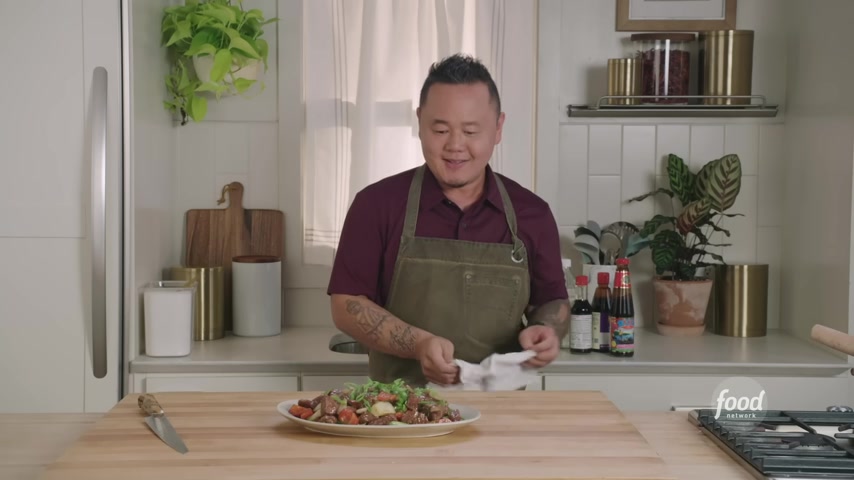
Wow .
I'm starving now .
Oh , there it is .
Uh , a beautiful hot platter of mongolian beef .
Hm .
That marinade makes this beef really feel like filet mignon .
Uh , the sauce .
That's sweet .
Savory marries perfectly with those kind of earthy bells and onions .
Well , there it is my friends , Mongolian beef .
Um , thanks for cooking with me today .
Um , I really hope you had as much fun as I did and we'll see you next time .
Are you looking for a way to reach a wider audience and get more views on your videos?
Our innovative video to text transcribing service can help you do just that.
We provide accurate transcriptions of your videos along with visual content that will help you attract new viewers and keep them engaged. Plus, our data analytics and ad campaign tools can help you monetize your content and maximize your revenue.
Let's partner up and take your video content to the next level!
Contact us today to learn more.